We’ve all heard of the mysterious writing condition that strikes writer’s at the most in-opportune moments: Writer’s Block. However, not every writer suffers from this epidemic. Some find their way around it before it even starts.
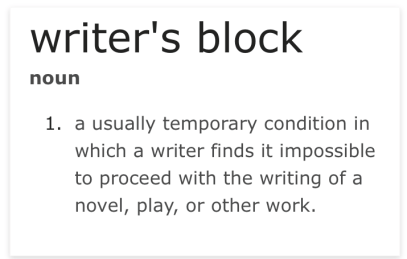
How can they possibly overcome it before it starts? Do these ideas work after it’s started? I am a writer who has never had writer’s block. I do struggle sometimes with plot points (especially in the novel I’m writing), but it’s not a block. I have 4 steps to avoiding it that may help you, too.
1. Set achievable writing goals
What? Writing goals? I briefly mentioned these in The Wonderful World of Writer’s Notebooks. If you have goals, you are more likely to write. This is true even in my classroom – my students have writing goals every grading period, and they work to achieve their goals all six weeks.

I have several long-term goals: write a memoir, keep up with my blog, read 25 books this year, stay in touch with my pen pals, and publish my first novel.
These goals won’t be reached in a single step, so I have to figure out how to get to the end. What I need is a plan. The planner above is where I create weekly goals that will take me one step closer to my ultimate goals. (You can’t see the right-hand side, but it has crochet goals, too.)
The only thing missing above is the actual plan. I don’t set aside specific days, though, because I know that I will miss one or want to work on something else that day. These are achievable weekly goals that I can work on anytime I have the opportunity during the week. My biggest struggle here is making sure not to set too many.

As you can see by this week’s goals, I took out the memoir pages and added revisions for my novel as part of Camp NaNo. We also had family in this week, so I had to make sure that any goals I set could still be achieved this week.
That’s the key: achievable goals. What’s the point of setting goals that can’t be reached? Where will it lead other than downhill? It could even lead to writer’s block, which will not help anything.
2. Open to a blank page and write any words (maybe even draw a picture)
What? What do you mean write any words? What kind of words? Anything! I mean it. Write in any format, too. Here are a few things that may fall out of your pen when you start writing:
- Your feelings: It’s okay to vent your frustrations. They may be holding you back from writing.
- A poem: It’s okay if that’s not your goal. Anyone can write a poem, and who knows, it may even let off some of your emotional steam.
- A list of words: That’s right, make a list of words that you could use for something. Use that dictionary or thesaurus to stretch your vocabulary.

- Learn a new word: Speaking of vocabulary, maybe you’ve heard or read a word recently that you didn’t recognize. Let that word fall out of your pen, and then discover it.
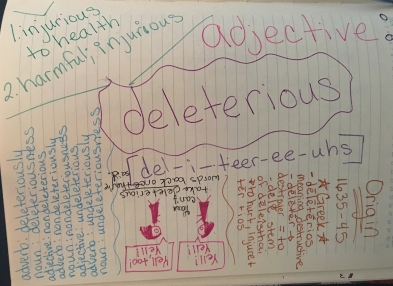
- A new idea: Yes, even a new idea may form on your no-longer-blank page. It’s okay if it’s not something you’re working on, let it happen anyway (you don’t want to block creativity).
- Anything: Simply see where that blank page takes you. (This is where drawing comes in. Even if you’re not an artist, you could still sketch whatever is on your mind.) It is not your enemy.

3. Read something
Is there a book you’ve been wanting to read for a while but haven’t had the time? Pick it up and read. Maybe you have a Goodreads reading goal that needs attention.

How does reading help you avoid writer’s block? It seems like it’s an easy way to avoid writing, doesn’t it? Nope. Reading offers your brain a break from your world while you peruse someone else’s world. Take advantage of the opportunity to learn from other authors:
- How are plot issues handled?
- What is the MC’s motivation?
- How is the setting introduced?
- Why are supporting characters in the story?
- How is each chapter leading to the central conflict?
- How is dialogue used to enhance the story?
- Are the characterizations consistent?
- Can I learn anything from the grammatical structures used?
Use this brain break to further your knowledge of writing as a reader. After you’re finished with a book, you have another writing opportunity: write a book review. Authors love to hear what you have to say about the books they’ve spent so long writing, so tell them and tell the world.
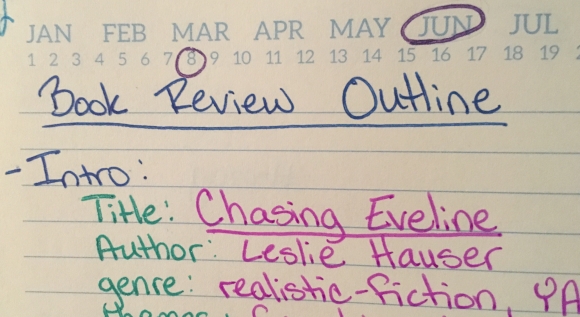
Reading offers up so many possibilities for you as a writer. Reading in your genre helps you see what’s going on in similar worlds. Reading outside your genre helps you see how other authors create their worlds, characters, plots, etc. compared to what you’re used to. The advice I’ve seen is to try to read from as many genres as you can.
4. Take time for your hobby
As you’ve already seen, my hobby (one of them, anyway) is crocheting. It is often neglected because I’m either reading or writing, though. If you’re experiencing writer’s block, or even just need a brain break before you continue that difficult scene, take some time to work on your hobby.
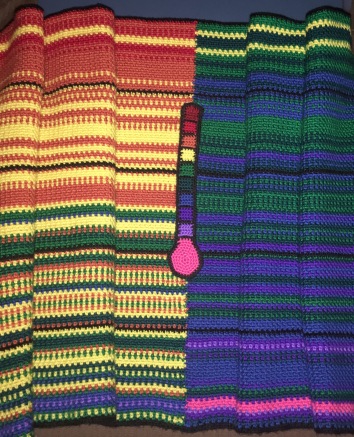
While you’re invested in your creative task, you may find your brain wandering back to your writing, which could lead you to an epiphany about your plot, character, or any part of it. Let it happen. Let your mind wander. However, if your hobby of choice requires saws or drills or the like, make sure you pay attention to your work while your mind wanders… You may need those fingers to write.
I’ve tried all of that… Now what?
Maybe something is keeping you from writing: stress, work, family, etc. Take some time away from the cause of your writer’s block, and enjoy the free time. You don’t even have to write: bask in the sun, read a book, catch a movie, go fishing. Do something that will help clear your mind and prepare you to write again.
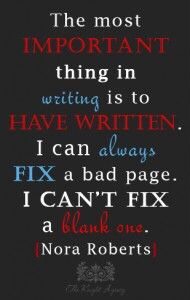
Don’t be afraid of that blank page or that novel that needs revised. You are there to make those pages better. You are there to turn those empty pages into something wonderful. You are there to fill those empty lines with your next big adventure.
After you clear your mind, go back through the list and see what you can achieve. You can overcome this “temporary condition.” You can.
How do you overcome writer’s block or avoid it altogether? Let me know in the comments!
Resources
Online Dictionary and Thesaurus
Book Review: Chasing Eveline by Leslie Hauser


Awesome post! It gave me some great ideas for future ‘block’ because I’m pretty sure I’ll get it again. 🙂
I had the worst case of writer’s block! It had never happened to me before, and it hit hard and fast, completely stopping my progress on writing Project #1. Looking back, I attribute my block to one thing… story exhaustion. I’d spent too much time in that world and… I got bored with it.
I tried and tried to be motivated, but it’s like my brain refused. After a few weeks of not being able to get back into it, I started to write Project #2, as something ‘fluffy’ to do in order to get my writing brain working again. I had so much fun diving in and it got me back in the mode.
A funny thing is happening now… I’ve been working on Project #2 for a month and I can feel it… I’m wearing down on this one. And my mind is creatively churning on Project #1 again!
I used to not understand how writers could work on more than one project at a time, but through this experience I’ve learned that not only can you do it, but sometimes it becomes necessary!
Learning about your own particular (and hidden) quirks is definitely a unique part of the writing experience!
LikeLiked by 1 person
Thank you for your response Charnae!
I have to work on multiple projects for the same reason: I don’t want to become bored with myself. It’s the reason I think stepping away from writing every now and then is essential, too.
We definitely need to learn how to read ourselves so we understand what we need.
LikeLike
Setting monthly goals for my writing usually helps me be more productive. If I’m not, it’s usually because family and life are too busy and are taking up all my time and energy.
I do crafty stuff and I have found doing it makes me want to write and be creative that way too.
LikeLiked by 1 person
Thank you for your comment! Goals definitely seem to help… as long as we are trying. What kind of crafty stuff do you like?
LikeLike
JJ,
If a writer is blocked, the remedy is to write something – anything! You’ve shared lots of great tips to get people’s pens moving again.
Great post!
LikeLiked by 1 person
Thank you! Writing something to get the pen moving is definitely my best remedy.
LikeLike
Ah, that’s interesting that you’ve never had writer’s block. I’m the same way, and every other writer I’ve talked to thought I was crazy!
Those are definitely some good ways to get through blocks, though, and it helps a person to work on their story just to write a few ideas or draw some pictures. I remember one of my writing teachers saying that we should write every day if we can, even if it’s about the most random thing.
I try to write as often as I can, though it’s not been easy since I’ve been busy. I hope commenting on things counts towards the every-day-writing xD Personally, if I’m not writing then I’m likely drawing for my stories, so I’m being productive with them either way.
It’s cool how you organized this, and I’m sure it will help those struggling with writer’s block! 😀
LikeLiked by 1 person
Thank you! I’m called crazy, too, since I never have writer’s block.
Replying to blogs definitely counts because not only are you writing, but you’re also reading!
Keep being productive.
LikeLiked by 1 person
I like the idea of prevention. When I get blocked it’s totally my fault.
Your are going to laugh but this is what works for me. I go out drinking with some friends. I get incredibly obnoxious but funny. I start to throw out crazy ideas that float in my head. But that seems to get the creative flow going again. The next morning I’m back at my desk writing.
At the end of the day, whatever works for you.
LikeLiked by 1 person
Thanks for your reply! It seems like you need to relieve stress in order to write, which is what I suggested! Sometimes creativity is blocked when we’re stressed.
Make sure you’re practicing safe drinking habits!
LikeLike
Hi! I love this. Especially “write any words”. My 1st drafts are full of so many awful terrible lines. haha. In my WIP today, I just wrote, “Ugh. This is a disaster.” 🙂 But it keeps me going and eventually I find the right words. Great post!
Leslie
LikeLiked by 1 person
Writing any words on the page counts as a win in my world! The “wrong words” eventually lead us to the “right words”… we hope!
Thanks for your comment!
LikeLiked by 1 person